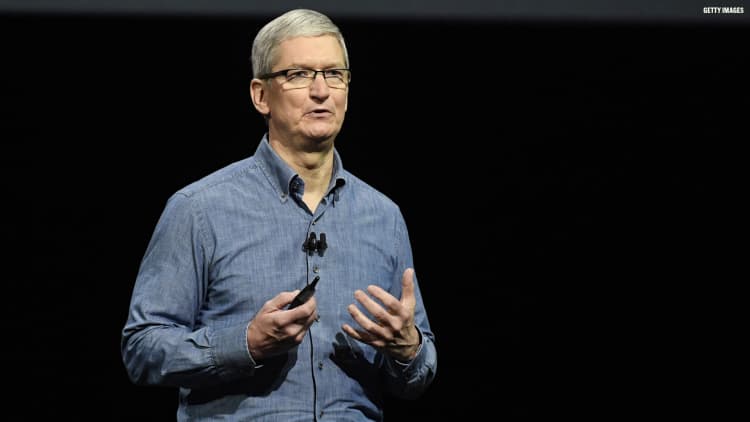Apple plans to unveil its three new smartphones at its product event this Wednesday. The company's latest offerings are expected to include an entry-level lower-priced model to replace the iPhone 8 and 8 Plus, a 5.8-inch upgraded iPhone X and a large screen high-end phone with a 6.5-inch screen, Apple's biggest ever.
Consumers can also expect watch improvements, particularly a hardware upgrade, and updates to the Apple's wireless charging mat.
At last year's reveal, which took place at Apple's new Steve Jobs Theater, the iPhone X was the most highly anticipated product. Apple CEO Tim Cook called the smartphone "the biggest leap forward since the original iPhone," adding that it would "set the path for the next decade," much like the original iPhone did 11 years ago.
Now the most valuable company in the world, after hitting a $1 trillion market cap this August, Apple can still trace its success back to the culture of innovation that late founder and former CEO Steve Jobs fostered over the years, according to a growth strategy consultant.
"Apple is constantly evolving," Scott Anthony, a managing partner at the growth strategy consulting firm Innosight, tells CNBC Make It.
When Apple first went public in 1980, it was worth about $100 million under the leadership of Jobs, who left Apple in 1985. When he rejoined in 1997, he faced the task of restructuring an organization that was on the brink of bankruptcy.
His first order of business was to drop costly projects and streamline the company's focus. And he did just that with the release of the 1998 iMac. The product sold nearly 800,000 units in the first few months, signaling a major turning point for the company.

The tech giant has a knack for pairing new technology with innovative business models, says Anthony. He points to the creation of iTunes and Apple's app store as two prime examples. "Apple came up with new ways to bring in revenue by getting people to consume microcontent," he explains.
In the early 2000s, Jobs saw an opportunity to target music fans who wanted affordable music but didn't want to drive to a store to buy expensive CDs. In 2003, the iTunes Music Store was launched and soon became the top music retailer, according to Rolling Stone.
Similarly, Jobs founded the App Store in 2008, which brought in hundreds of developers who were eager to make easy money. "Nothing like the App Store existed before, and it has fundamentally changed the world," Cook said at a 2013 Worldwide Developers Conference.
Apple also looks beyond its organization, by gauging what its competitors are doing and taking it one step further, says Anthony. That's something he firmly believes other companies need to do a better job of to succeed.
"Leaders need to get out of the building," he tells CNBC Make It. "Leave your swanky office and take a look around. See what competing businesses and start-ups are working on."
Leave your swanky office and take a look around.Scott Anthonymanaging partner, Innosight
Jobs stayed abreast on Google's Android system and once threatened to eradicate the mobile operating system because he felt that it was a copy of the iPhone. "I'm going to destroy Android because it's a stolen product," Jobs is quoted as saying in his authorized biography. "I'm willing to go thermonuclear war on this. "
Another example? Blackberry. At the time of the iPhone's first launch, competing smartphones like Blackberry were using QWERTY keyboards and styluses.
Apple took a different approach to its first iPhone in 2007 by adding a multi-touch screen. This simple, yet innovative design revamped the style of smartphones worldwide and propelled Apple as a leader in mobile technology.
Blackberry, once a mobile giant, was unable to compete and the company's smartphones have since fallen by the wayside.
Anthony advises leaders to always look for new technology, noting that you shouldn't be afraid of throwing away old business models that are no longer effective. "A true leader will say goodbye to the past," he says, "and be able to let go completely."
"Apple really became Apple version two with the release of the iPod, which they really don't even sell anymore," Anthony continues. "Apple has never been afraid of being overly constrained by yesterday."
Like this story? Like CNBC Make It on Facebook.
See also:
Steve Jobs and Albert Einstein both attributed their extraordinary success to this personality trait

This is an updated version of a story that appeared previously.


